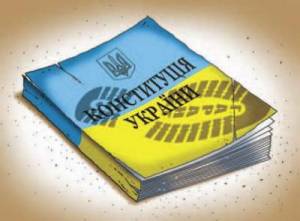Bypassing the Constitution

Among the numerous calls to veto dangerous laws ignored by President Yanukovych this year alone, the Law on National Referendums signed into force on Tuesday may seem innocuous enough. What, after all, could be more democratic than referendums?
Democratic or manipulative
If asked in a referendum to decide whether the death penalty should be reintroduced, the reader will have a clear opinion. If asked in one referendum to say yes or no to changes to the Constitution written in difficult legalese, as well as a few other equally complex issues, the majority of citizens will experience difficulties. If then, the campaign leading up to the referendum is run solely by the local authorities with no guarantee that both sides of each issue will get equal airing, and the increasingly submissive media presents only one side, can we consider the result to reflect the will of the people? Especially when the said popular vote is to be assessed by the Central Election Committee which will have complete responsibility for appointing precinct and district election commissions to organize the vote and vote count?
These are just some of the objections to the Law on National Referendums which President Yanukovych signed on 27 November. Authoritative analysts including one of the authors of Ukraine’s Constitution, Viktor Musiyaka believe the law to be unconstitutional and very dangerous.
With likely deviousness, but also supreme irony, the law was “passed” in blitzkrieg fashion on 6 November as both Ukrainians and the international community followed the dubious vote count in elections which fell far short of democratic standards with mounting concern.
The sudden re-appearance of this draft law should have raised alarm bells. All documentation was from July 2010 when the draft law had been sent back to be reworked and then submitted for a repeat second reading since some of its norms were in breach of the Constitution. They remain in breach, no propositions were taken into consideration, yet the same law was pulled out and hastily “passed” in November 2012.
According to this new Law, the Constitution can now be amended or a new version introduced on the basis of a referendum alone, with the Verkhovna Rada simply not involved. This is clearly in breach of Part XIII of the Constitution, but conveniently avoids the need to get a constitutional majority, i.e. two thirds of the MPs. The Party of the Regions has made no secret of its wish to secure such a majority, but remains far from the requisite number.
Now the issue can be put to a referendum with other issues also included. This runs counter to Council of Europe recommendations which suggest strictly limiting the number of questions in any referendum so that people have a chance to fully understand the issue they are voting on.
Other recommendations are just as disturbingly flouted with no regulation of the subject and procedural suitability of the texts to be voted on, nor public funding and campaigning for the referendum. There is no guarantee of equal access to the media of all interested parties. The State authorities and bodies of local self-government will exert enormous influence at almost all levels. Moreover the makeup of the election commissions will be at the submission of bodies of local self-government, with political parties not involved at all.
All of the above and other concerns are clearly only important where the issues in question are contentious, involving constitutional changes, changes to how the President is elected (or for how many terms), State language, etc. Given the haste in passing the bill, the timing (with the old, reliable ruling majority still in office), as well as the irregularity with which a version rejected for constitutional infringements was brazenly pushed through, there seem ample grounds for concern.





